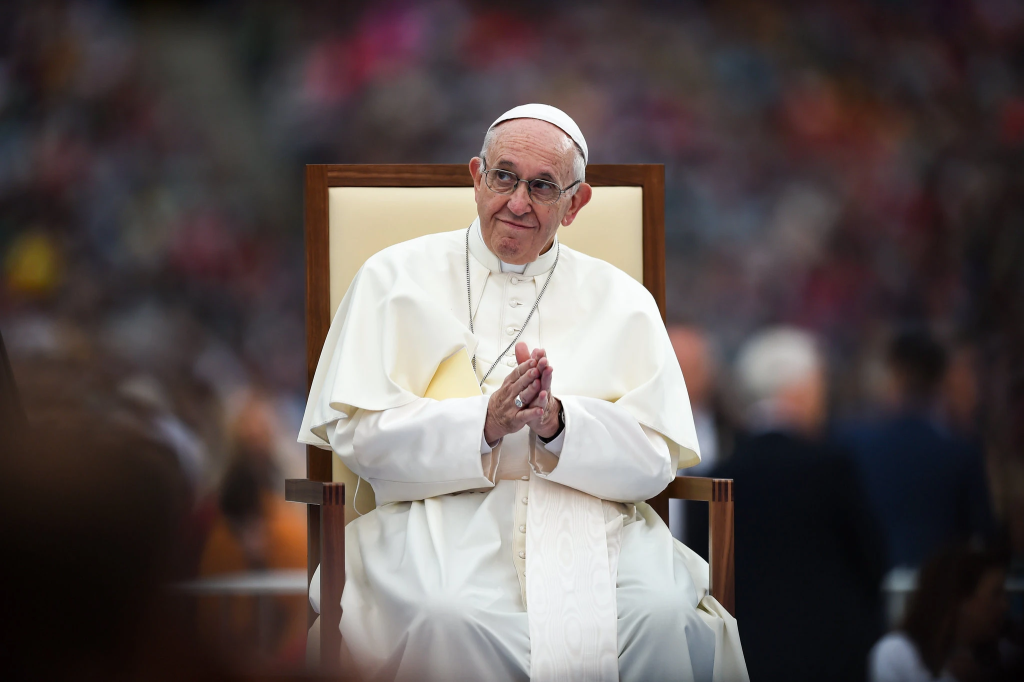December 21, 2023
What Now For Those Evangelicals Who Fled to Rome?

From Rome To Where?
Where to now for the young evangelicals who left the Reformed faith for the safety and security of Rome? A Rome whose walls would never be breached, we were led to believe, by the ravages of the post-Christian Sexular Age?
The announcement by the Pope that same sex relationships can be blessed by the church raises a serious question for the trickle leading to a flood of evangelicals (often young men, with growing families who wanted to be more crunchy in their faith) who crossed the Tiber.
And where to now for former Church of England bishop, Michael Nasir-Ali, who left for Rome , for similar reasons? What reasons did he give for leaving? Here he is in his own words:
The Church councils and synods are permeated by activists who each have a single-issue, often faddish agenda, whether it is about cultural correctness, ‘climate change’, identity politics, multi-culturalism (which actually encourages communities to live separately) or critical theory on race, religion and gender – a neo-Marxist theory developed to create conflict by dividing people into victims and villains.
And he assumed a Jesuit pope would be a better offer?
Now I’ve got some skin in this particular game, with a former pastor friend and mentee I know heading to Rome in something of a shock and a surprise. Though not, I would add, as much of a shock and a surprise looking back on it.
In keeping with many young Reformed types who were seeking crunchier and crunchier expressions of faith, it seemed that the main drawcard to Rome was similar to the main drawcard for those heading towards the so-called Moscow-Idaho vibes of the Federal Visionists.
And I have to say, in both instances, since both groups draw from the same crowd, it’s definitely a vibe thing and not a theology thing first and foremost. The theology ends up getting retro-fitted to suit the vibe, in much the same way that the post-Southern Baptist young hipsters congregated on Mark Driscoll’s lawn to drink Scotch, smoke cigars, and stroke their beards. (True story, I was there!).
And what is that vibe precisely? Well part of it seems to be a desire for something immoveable, something permanent, that so much modern evangelicalism was lacking. Something that can counter the enervating and pernicious critical-theory-saturated apology that passes for Western intellectualism these days.
The Federal Vision crowd wish to see some sort of national revival that will put Christian magistrates back in charge. And what’s not to like about a re-Christianised culture, after the potpourri postmodern mess of the last few decades? Can’t the adults be back in charge?
And Rome? Well Rome’s been around a long time and will be around a long time. Like a glacier, it is thought, Rome can shift culture over time, carving out a path down the mountain, disposing of the cultural scree in its all-embracing wake.
All we have to do is stand behind and let it do its work. Oh, and of course, for some evangelical youngsters of a particular absent-father ilk, there’s a sense in which you can come to Papa, a distant figure of course, but always there in some iteration.
Shape-Shifting Rome
But of course, the sad reality is that Rome is a shape-shifter far more than it has been a shape-carver. And none more so than a Jesuit Pope like Francis. And while I love Catholic public theology journal, First Things, and admires its confidence in the public square, First Things is not Rome.
First Things is not the papacy. I have read plenty of articles decrying the current pope (and I agree with many), while longing for the previous pope, Benedict XVI, (and I tend to agree with that as well).
Yet that’s the mistake many younger evangelicals have made who crossed to Rome. They believed that the public square was the battle ground, and that the public square was a good enough reason to convert. I am convinced that many – having crossed for public theology reasons – have then moved to squeeze Roman Catholic soteriology into some sort of orthodox biblical framework.
Having decried the affirming evangelicals, and having decided that mainstream evangelicalism was too flabby to hold back the tides of cultural sewage swamping the traditional family, they now find themselves right back where they started.
It must feel a little like those bad dreams where you think you have escaped a terrible situation only to find yourself right back in that creepy house again, and you don’t know how that happened!
With this pronouncement such types are surely caught in a bind. Surely they are losing some sleep at night. And to push the house analogy a little further, surely they are asking at what point they might, like tenants caught in a rental trap having to move every six months or so, begin to wonder if they will ever find a permanent home.
First Things‘ senior editor, Dan Hitchens, sums up the quandary well when he likened the confusing, almost contradictory statements coming out of the Vatican in its Fiducia Supplicans as a black hole, a densely packed amount of energy that refuses to even let light escape. Hitchens states:
A black hole is still a star—just as Pope Francis is still the Vicar of Christ—even if it appears to have collapsed in on itself. Such a spectacle is mesmerizing, mysterious, and frightening. But it does not mean that we should give up on the papacy in general—let alone the saints, the sacraments, the traditional doctrine of the Church. These remain the stars to steer by, the stars which will guide us to the Christmas crib.
The problem of black holes of course, is that they suck up a lot of energy, and require an awful lot of reverse thrust to avoid (well in Sci-fi movies they do). And the Roman Catholic church’s more orthodox leaders, members, and appeasers, seem intent of using up that energy explaining to us how such things can be. I mean, with all that’s going on in the world – culture wars and actual wars – “ain’t nobody got time for that!”
But perhaps – with apologies to Dan – perhaps it does mean that we should give up on the papacy in general. After all, that’s been the Protestant perspective for some five hundred years (despite the splintering “nova effect” that Charles Taylor declares is a spin-off from the Reformation). I’m fairly hopeful that there might be a crossover: our jaded evangelicals leaving for Rome bumping into frustrated Roman Catholics looking for the missing link to their theology.
Which brings us to…
Sola Scriptura
The Bible of course. The critical role in the Reformation of the idea “ad fontes” – back to the source. For all of Dan Hitchens’ desire for orthodoxy, he is still going to leave us one floor short on the way to bedrock: The Scriptures themselves! We are, after all, as evangelicals, sola Scriptura people.
And just to rebut any who claim that this leaves everything to the individual, and individualist, interpretation, this helpful article at The Gospel Coalition Australia site, by Marty Foord, clears that little matter up before it gets a full head of steam. In particular, and in contrast to the black hole of the latest Vatican pronouncement, sola Scriptura includes:
.. the clarity of Scripture. This did not mean that all of Scripture was crystal clear to every Christian. It also did not signify that pastors and teachers were not needed to help laypeople understand Scripture (Eph. 4:11-12). The clarity of Scripture denoted that any person could read Scripture for themselves and discover the basic way of salvation. The reformers did agree that parts of Scripture were difficult to understand. But these passages did not threaten the sufficiency of Scripture.
The fog of culture war is bad enough without the fog of a battle for interpretation based on the current pope’s proclivities.
The evangelicals who left for Rome were certain that Rome’s view of the cultural mess was scriptural. And now they are finding that Scripture isn’t really coming into it, unless in some sort of mediated manner, much like so much else in Rome.
And what they – and for that matter Michael Nasir-Ali – will find, is that there is still a cohort in the global church that is not for turning when it comes to the Sexular Age. And most, though not all, are in the evangelical camp.
And there’s a reason for that. We are not atrophied believers who think that nothing should change. But we are bedrock believers who are committed to Scripture as our foundation. And will test all things – even saints, sacraments and traditional doctrines of a church that does not recognise the legitimacy of another other church, against it.
Does the Lord have yet more light and truth to spring forth from his holy Word, as Puritan John Robinson stated? Yes, of course, but truth and light that is tested against Scripture, not used against Scripture. The revisionists and heterodox of our day would have us think otherwise.
Those who have moved to Rome for something immoveable will to their dismay, find that Rome, as it always has done despite the negative press about its intractability, has always moved with the times.
Written by
There is no guarantee that Jesus will return in our desired timeframe. Yet we have no reason to be anxious, because even if the timeframe is not guaranteed, the outcome is! We don’t have to waste energy being anxious; we can put it to better use.
Stephen McAlpine – futureproof
Stay in the know
Receive content updates, new blog articles and upcoming events all to your inbox.




